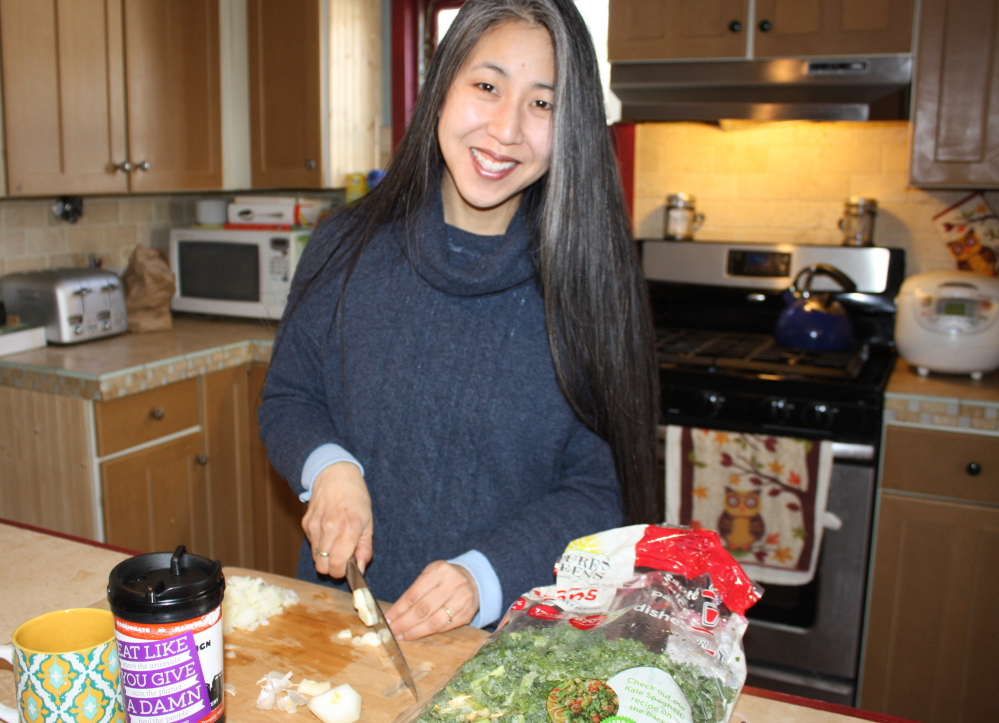Editor’s note: This is the sixth in a seven-part series about what it’s like to be a vegetarian in Maine today.
When Kara Owens was a child, her father worked as a butcher. Needless to say, her attempts to go vegetarian weren’t successful.
She did manage a few months of vegetarianism when she was 15 and a couple weeks here and there afterward. But mostly she ate what everyone else ate.
“We were a meat- and chicken-heavy family,” said Owens, who lives in Scarborough.
In fact, her dad wasn’t just a butcher but the head of the meat department at the major grocery store in her hometown of Grand Union, New Jersey.
“He said, ‘If everyone went vegetarian like you, I’d be out of a job,’ ” Owens, now 40, recently recalled.
Fast-forward to January 2014 and Owen, the mother of a now 5-year-old daughter, was looking at Facebook one day, where she saw a video posted by a friend.
It showed the routine dairy farm procedure of a newborn calf being taken from its mother.
“The mother cow chased after her baby and cried for her baby,” Owens said, her voice still raw with emotion. “It hit me in everything in me that is a mom.”
She decided on the spot to go vegan. She hasn’t looked back.
Such on-again, off-again, on-again relationships with vegetarian eating aren’t unusual. According to a recent survey by the animal advocacy group Humane Research Council, at least 10 percent of U.S. adults are former vegetarians and more than a third of that number would like to go vegetarian again.
FORMER RANCHER
Writer Genevieve Morgan of Portland grew up in New York City, also in a family of omnivores. She was a teenager in the 1970s when her stepsister went vegetarian. “I remember my stepmother and father yelling at her at the dinner table,” Morgan, 47, said. “It was looked at as a hippie, alternative lifestyle.”
When she went off to study at Bowdoin College in Brunswick, Morgan could chose her own meals, and she chose vegetarian food. After that, she worked in a health food store, learned about macrobiotic cooking and continued to eat a vegetarian diet.
Then she met, fell in love with and married the son of a cattle rancher. They moved to the ranch in Fresno, California, had two sons and Morgan gradually started eating meat again.
“It just crept up on me,” Morgan said. “I’ve never liked meat on the bone. If it didn’t look like meat, I could eat it.”
While living on the ranch, Morgan had a firsthand (and picturesque) view of the initial stage on the road to hamburgers and steaks.
“The cows were happy and grazing over the Fresno hills, but I know the feedlots they went to (after they left the ranch), and I know where they went after that,” Morgan said, referring to the slaughterhouse. “I had all these conflicting things in my head.”
Eventually, her father-in-law sold the ranch and Morgan and her family moved to Portland, where she learned she had a genetic kidney disorder. A naturopath she consulted with recommended a mostly vegan diet. Morgan followed that advice, returning – albeit for different reasons – to something like the vegetarian diet she’d once abandoned.
SEEING HEALTH CHANGES
Better health is also what brought Jessica Tracy and Larry Lemmel back to plant-based food. Twenty years ago, when the couple lived in Boston, they dabbled in vegetarianism and took a macrobiotic cooking class. “But I didn’t like it,” Tracy admits; she found the recipes bland.
Soon after they moved to Maine, Tracy and Lemmel returned to eating meat. Then five years ago, they signed up for the Lifestyle Choices course at Parkview Adventist Medical Center in their hometown of Brunswick and learned about plant-based vegan eating. They decided to become full-time vegans.
“It changed our lives, really,” said Tracy, 75. “We started out doing it for health reasons. We’ve since learned more about the environmental impact and factory farming and that helps solidify it for us.”
Lemmel, 82, who has suffered from Type 2 diabetes for 40 years, said the amount of insulin he needs to take has dropped by half. “If I had done this 20 years ago, I may have been able to reverse my diabetes.”
Moreover, he was able to stop taking his cholesterol-lowering drugs entirely. “I feel very good,” he said, “and I have plenty of energy.”
They eat out at least once a week, frequently invite friends over for lunch and attend a regular vegan potluck at their church, the Unitarian Universalist Church of Brunswick. They’re part of a new wave of Mainers who’ve rediscovered their former vegetarian ways.
“I would have loved to have done this 20 years ago,” Tracy said. “But in some ways, I think being older and seeing people have chronic health conditions around me has really opened my eyes.”
Avery Yale Kamila is a freelance food writer who lives in Portland. She can be reached at:
avery.kamila@gmail.com
Twitter: AveryYaleKamila
Send questions/comments to the editors.



Success. Please wait for the page to reload. If the page does not reload within 5 seconds, please refresh the page.
Enter your email and password to access comments.
Hi, to comment on stories you must . This profile is in addition to your subscription and website login.
Already have a commenting profile? .
Invalid username/password.
Please check your email to confirm and complete your registration.
Only subscribers are eligible to post comments. Please subscribe or login first for digital access. Here’s why.
Use the form below to reset your password. When you've submitted your account email, we will send an email with a reset code.